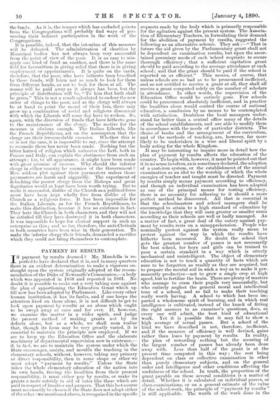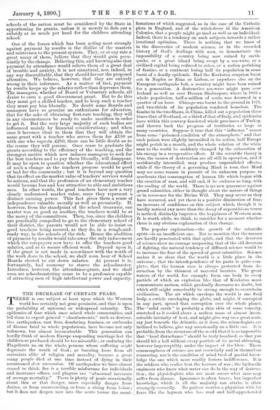PAYMENT BY RESULTS.
IS payment by results doomed ? Mr. Mundella is re- ported to have declared that it is, and in many quarters there is an evident determination to make a vigorous on- slaught upon the system originally adopted at the recom- mendation of the Duke of Newcastle's Commission,—a body which was appointed in 1858 and reported in 1861. No doubt it is possible to make out a very taking case against the plan of apportioning the Education Grant which up till now has been adopted by Parliament. Like every other human institution, it has its faults, and if one keeps the attention fixed on these alone, it is not difficult to-get to look upon payment by results as an abuse which ought to be swept away at once and for ever. If, however, we examine the matter in a wider spirit, and judge the present method of making grants not by its defects alone, but as a whole, we shall soon realise that, though its form may be very greatly varied, it is essential to maintain the principle now employed. If we are to keep up the Education Office and the elaborate machinery of departmental supervision now in existence,— if, in fact, we are to maintain the system under which the State encourages, assists, and moulds the teaching in the elementary schools, without, however, taking any primary or direct responsibility, then in some shape or other we must adopt " payment by results." Unless the State takes the whole elementary education of the nation into its own hands, freeing the localities from their present responsibility, it must either pay by results, or make its grants a mere subsidy in aid of rates like those which are paid in respect of lunatics and paupers. That this last course must necessarily be chosen if the State does not adopt either of the other two mentioned above, is recognised in the specific requests made by the body which is primarily responsible for the agitation against the present system. The Associa- tion of Elementary Teachers, in formulating their demand for the abolition of payment by results, suggested the following as an alternative scheme. They ask :—" That in future the aid given by the Parliamentary grant shall not be dependent on examination results, but upon the ascer- tained pecuniary needs of each 'school requisite to secure thorough efficiency ; that a sufficient capitation grant should be paid according to the average attendance at each school ; and that the grant should be paid if the school is reported on as efficient." This means, of course, that unless schools are so bad as to be pronounced inefficient, and so not entitled to receive a grant at all, they shall all receive a grant computed solely on the number of scholars in attendance. In other words, the supervision of the Education Office would be entirely gone. Few schools could be pronounced absolutely inefficient, and in practice the localities alone would control the course of national education, a conclusion by no means to be contemplated with satisfaction. Doubtless the local managers under- stand far better than a central office many of the details of the school establishments, and are able to modify them in accordance with the needs of particular districts. The choice of books and the arrangement of the curriculum, and of the methods of teaching, are, however, far more likely to be undertaken in a wise and liberal spirit by a body acting for the whole Kingdom. It may be interesting to inquire more in detail how the plan of payment by results affects the education of the country. To begin with, however, it must be pointed out that it in no sense involves, as is sometimes declared, the adoption of a cast-iron system, or the establishment of the annual examination as an idol to the worship of which the whole energies of teacher and taught must be directed. Payment by results simply means payment according to efficiency, and though an individual examination has been adopted as one of the principal means for testing efficiency, there is no necessity for adhering to it should a more perfect method be discovered. All that is essential is that the schoolmasters and school managers shall be encouraged to attain to a high standard of education by the knowledge that they will earn greater or smaller sums according as their schools are well or badly managed. As a matter of fact, a great deal of the outcry against pay- ment by results rests on a misapprehension. People who nominally protest against the system really mean to protest against the way in which the results have hitherto been measured. No doubt the school that gets the greatest number of passes is not necessarily the best school, for boys and girls can be trained to pass a certain standard in a way which is utterly mechanical and unintelligent. The object of elementary education is not to teach a quantity of facts which are sure to be forgotten as readily as they are acquired, but to prepare the mental soil in such a way as to make it per- manently productive—not to grow a single crop at high speed, but to fertilise the brain. There are plenty of masters who manage to cram their pupils very successfully, but who entirely neglect the general moral and intellectual tone of a school, and so fail to make their teaching really worth having. A school to which has been im- parted a wholesome spirit of learning, and in which real intelligence is cultivated, instead of the knack of fitting the right answers to an examiner's questions, does, as every one will admit, the best kind of educational work. Yet it is possible that it may fail to show a high average of actual passes. But a school of the kind we have described is not, therefore, inefficient, and if the measure of efficiency is well devised, gains rather than loses by payment by results. In reality, the plan of rewarding nothing but the securing of the largest number of passes has already been done away with. Less than half of the grant is at the present time computed in this way ; the rest being dependent on class or collective examination in other than purely elementary subjects, and on the general order and intelligence and other conditions affecting the usefulness of the school. In truth, the proportion of the grant payable on these several conditions is a matter of detail. Whether it is calculated on individual passes, or class-examinations, or on a general estimate of the value of the school-work, the principle of " payment by results " is still applicable. The worth of the work done in the schools of the nation must be considered by the State in apportioning its grants, unless it is merely to dole out a subsidy at so much per head. for the children attending school.
One of the forces which has been acting most strongly against payment by results is the dislike of the masters and mistresses to the present system. They, or at any rate a great many of them, believe that they would gain pecu- niarily by the change. Believing this, and knowing also that payment by attendance would relieve them of a great deal of trouble and anxiety, it is not unnatural, nor, indeed, in any way discreditable, that they should favour the proposed alteration. We believe, however, that they are entirely wrong in their inference. As a matter of fact, payment by results keeps up the salaries rather than depresses them. The managers, whether of Board or Voluntary schools, all desire to earn a good Government grant. BO to do this they must get a skilled teacher, and to keep such a teacher they must pay him liberally. No doubt some Boards and managers have so genuine an enthusiasm for education, that for the sake of will , obtaining first-rate teaching, they wi in any circumstances be ready to make sacrifices in order to get it. But the very large majority of such bodies are influenced mainly by financial considerations ; and when once it becomes clear to them that they will obtain the same grant with a teacher who serves them for £150 as with one who expects £250, there can be little doubt as to the course they will pursue. Once cease to graduate the grants according to the efficiency of the teaching, and the strongest motive which now induces managers to seek for the best teachers and to pay them liberally, will disappear. It may be open to question whether the educational effect of such a change as the teachers propose would be good or bad for the community ; but it is beyond any question that its effect on the market value of teachers' services would be serious, and that the profession of an elementary teacher would become less and less attractive to able and ambitious men. In other words, the good teachers have now a very clearly understood market value, since they represent a distinct earning power. This fact gives them a sense of independence valuable morally as well as pecuniarily. If, however, from the standpoint of the school treasurer, one master was as good as another, the teachers would be at the mercy of the committees. Then, too, since the children are practically compelled to go to the elementary school of their district, the parents would not be able to insist on good teachers being secured, as they do, in a rough-and- ready way, in the schools of the rich. Hence the abolition of payment by results would take away the only inducement which the ratepayers now have to offer the teachers good salaries, and so to secure efficient work. Depend upon it, if the grant is not made in accordance with the worth of the work done iu the school, we shall soon hear of School Boards elected to cut down salaries. At present it is, fortunately, bad economy to starve the schoolmaster. Introduce, however, the attendance-grant, and we shall soon see schoolmastering cease to be a profession capable of attracting men of high intellectual power and capacity.















































 Previous page
Previous page